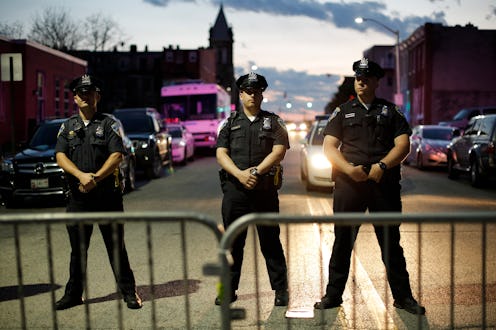News
What Can Baltimore Police Learn From Ferguson?
The chaos in Baltimore isn't unfamiliar to those even loosely attuned to current events. There are haunting parallels to events in Ferguson, New York City, and Cleveland involving the killings of unarmed black men — and in Cleveland's case, a 12-year-old boy playing with a toy gun in a park — by police officers who allegedly used excessive force. Those cases, among others, sparked a wave of unbridled outrage across the nation, as Americans demanded justice. While the anger in Baltimore isn't new, what lessons can Baltimore police learn from Ferguson?
Protest violence in Baltimore, initially peaceful, bled into Monday as riots began after Freddie Gray's funeral in the early afternoon. The 25-year-old landed in a coma from a broken spine that was allegedly suffered while in police custody. A week later, Gray died. Bustle has reached out to the Baltimore Police Department for comment.
Ferguson was really the first incident that managed to highlight the problem of police brutality on a national — and even international — stage. Since last year's incidents, cities have begun to tackle such issues with more fairness and sound judgment; early this month, an officer in South Carolina was charged with murder after allegedly shooting a man who was running away from him seven times in the back.
Much like the case of Eric Garner, the man whose abuse by NYPD officers was caught on tape, the South Carolina incident was recorded and made public, too. But unlike the officer who killed Garner, the South Carolina officer was charged with murder, signaling hopeful change in terms of how the justice system handles such cases.
There are stark differences between the police department in Ferguson and Baltimore. For one, while both cities have a large population of African Americans, Ferguson's city officials and police department were mostly white. The Christian Science Monitor noted that Baltimore Mayor Stephanie Rawlings-Blake and Police Commissioner Anthony Batts are both black, and were quick to challenge the city's police actions in dealing with Gray.
Baltimore police — made up of markedly more African Americans than Ferguson's police department — were reportedly instructed to grant protestors space to vent their anger, according to BBC, something that Ferguson police did almost the opposite of by responding to protestors with heavy-handedness.
But like Ferguson, New York City, and Cleveland, many Baltimore minorities express similar claims of racial profiling. Many said that they are tired of being unjustly targeted by the police. Resident Charles Eubanks, sporting a broken nose, spoke to Mashable and claimed that the police had stormed into his recording studio and one had stepped on his head. (Bustle has reached out to the Baltimore Police Department for comment.) Eubanks told Mashable:
This is every day for us. You know if you run from the police what the consequences are.
While Baltimore has certainly learned from Ferguson in some respects, in many others, it seems like there's still more the Maryland city could have done better, both in dealing with a black man police apparently suspected of a crime and possibly in handling the ensuing protests. Although police brutality seems to be going through a thorough investigation on a federal level, potentially fatal problems remain that need to be sorted out in law enforcement across the country.
Image: Getty Images (3)
